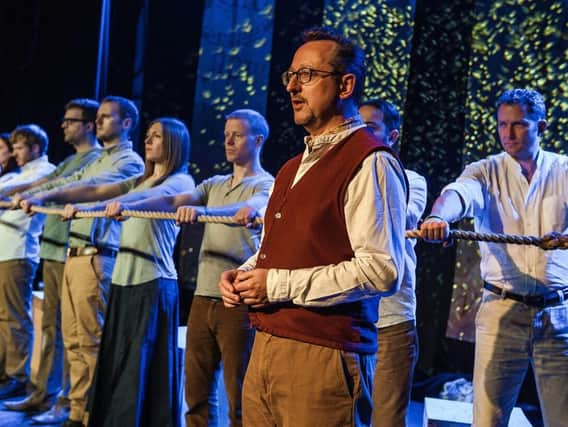Be transported by a story still resonating with audiences


The Transports was created by singer-songwriter Peter Bellamy after he read a story in his local Norfolk newspaper about the first transport ship to Australia. It is based on the remarkable true tale of convicts Henry Cabell and Susannah Holmes in the 18th century.
The album was released on Free Reed Records in 1977 featuring some of the biggest names from the '70s folk revival '“ The Watersons, Martin Carthy, Nic Jones, AL Lloyd, June Tabor, Cyril Tawney and Dave Swarbrick.
Sadly Bellamy took his own life in 1991 aged 47.
Advertisement
Hide AdAdvertisement
Hide AdFor this revival, a contemporary cast has gathered that is the modern equal of the original.
The Young'uns, BBC Radio 2 Folk Awards Best Group (2016 and 2015) have joined forces with fellow Folk Awards winners Nancy Kerr (Folk Singer of the Year 2015) and Greg Russell (Young Folk Award and Horizon Award).
They are joined by ex-Bellowhead cellist Rachael McShane and celebrated trio Faustus (Paul Sartin, Benji Kirkpatrick and Saul Rose). Sartin, another former member of the much-missed Bellowhead, is also musical director of the project while author, storyteller and folk singer Matthew Crampton is the narrator and Tim Dalling (The New Rope String Band) is creative director.
Matthew Crampton tells how he got involved: 'They knew me because I hang around the folk world, and I have a show called Human Cargo [subtitled Stories and Songs of Emigration, Slavery and Transportation], based on a book I wrote, telling stories and singing songs.
Advertisement
Hide AdAdvertisement
Hide Ad'They liked the format and they were looking for a way to make The Transports work in a way it hadn't worked before.
'It's legendary in folk terms, and it's a great story, but it's been very seldom performed on stage.'
He has introduced a narrative that expands on the album's story making it more than 'just' a collection of songs.
'We realise very much that we must pay tribute to what Peter put together, but on the other hand, I'm not a folky myself, I'm sort of from outside that world, so I'm not afraid to bring in different ideas, which I did. I brought in a spoken narration, a storytelling running through the whole thing.
Advertisement
Hide AdAdvertisement
Hide Ad'I was amazed when IÂ came across this story, I thought it was incredible, and the music's wonderful, but the story didn't really come across to me, and I wanted to find the way to get it across to audiences.'
But Matthew's keen not to overstate his role in the project.
'I'm very interested in narrative structure and story giving it a proper narrative arc. The main thing is releasing the genius in the songs, and that's down to Paul and his incredible arrangements.
'There's 10 people on stage throughout - nine musicians and me.
Advertisement
Hide AdAdvertisement
Hide Ad'The arrangements, I like to say, for people who don't like folk music, or think they don't like it, this is a very good entry level drug because they're seeing English folk music at its best. I can say that because I'm not one of the musicians!Â
'You're seeing technically exceptional musicians, plus you're hearing what is distinctive about English folk music '“harmony singing, robust harmony singing, it's wonderful.
Matthew found the new project dovetailed nicely with his own work on Human Cargo.Â
'I found with my show, which like this uses stories and folk songs to explore stories of slavery, immigration and transportation, from two-three centuries ago, I wasn't interested in approaching this subject, purely form a historical perspective.
Advertisement
Hide AdAdvertisement
Hide Ad'It has to me, to be casting light on the subject today. And today, the issue of migration, the movement of people into this country is one of the key issues of our time.
'And it's also quite a toxic debate and quite divisive. I'm interested in trying to broaden the debate and build bridges, and how people who are very hostile on either side may look at things differently.
'This is where history comes in '“Â you tell stories from 2, 300 years ago and we were the migrants.
Those people who went on boats to America, they went through conditions which were considerably worse in many ways than people getting on boats in the SE med, if one can understand how migration has been a constant in human history, then maybe one doesn't necessariyl as either a horror or as something that needs to be '˜solved' or stopped, it's always going to happen
Advertisement
Hide AdAdvertisement
Hide AdAt every stop on the tour, Matthew has been working with a local group working with immigrants or refugees. In Southampton it's an organisation called City of Sanctuary. 'I've set up something called the Parallel Lives project, at every show of the tour I take a few minutes telling local stories, I gather and research stories about that town.
'Wherever we happen to be, I'll tell stories from 2-300 years ago, and I'll counterpoint those with stories of people who arrived in the town of Syrians or Somalis in the last few years, it might be Kindertransport from before the war, or Belgian refugees in 1914Â when the war broke out '“Â 200,000 Belgians arrived in Britain within weeks, almost every town in Britain took them in. Can you imagine that happening today?'
'I also invite a local refugee or migrant support group to attend and they'll be in the foyer to talk to the audience, providing information - I don't want to overstate this - we're not changing the world, it's a little thing that might help provoke some conversation.'
Turner Sims, Southampton
Friday, January 19